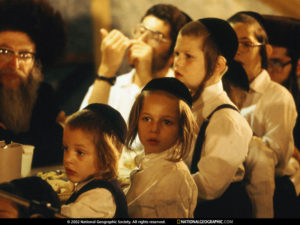Ultra-Orthodox neighborhoods in Israel are like islands of old Europe in the Middle East: men with clothes fully covering their bodies in the blazing Mediterranean sun, teenage girls caring for younger brother and sisters, faces of young boys peeping out of a window as the Rabbi’s voice is heard in the back. The buildings are shabby, not a touch of greenery in sight, people cross the street completely ignoring streetlights, and everyone seems to be rushing somewhere.
When I was a child, secular Israelis use to look at ultra-Orthodox men with great respect. I remember my father, an art historian, saying with some admiration that they study all day long, from sunrise to sunset. They have such a spiritual expression, my mother would murmur. And when Orthodox men climbed on the bus I would move respectfully to another seat, knowing they never seat next to women, or even girls. Completely cloistered in their neighborhoods, we saw them as highly intellectual communities, in spite of the fact that they studied only Jewish texts.
But all this has changed dramatically over the years. As their world was gradually brought to light, many changed their perspective. I came to the conclusion that my father’s idea of Orthodox men was really a reflection of his own longing for certain aspects of life in the Diaspora. Today they are seen by some Israelis as backward – some even use the word “primitive” – society, exemplifying an underdeveloped way of religious life. Some experts argue that their seclusion generated intellectual regression; others say their political power destroyed the spiritual fabric of the community. Be that as it may, in the last couple of years the Israeli government has been trying to force ‘core studies’ on Orthodox schools: mathematics, English, sciences, history – without much success. Just as they do away with computers, smartphones, television, so their leaders won’t have their students learn secular topics. They manage to maintain a separate educational system, teaching almost exclusively holy texts.
In the last year or two, perhaps even before that, there have been rumors about a change taking place: young people are leaving ultra-Orthodox communities, sometimes moving to the Tel Aviv area, adopting a modern secular lifestyle. The exact numbers are of course unknown. Organizations of former Orthodox claim that thousands are deserting the religious way of life; others present a different picture. Estimations range from hundreds to tens of thousands. Facebook forums of ex-Orthodox are very popular now (for example: https://www.facebook.com/Shikta.Bmrfst/). They are often blunt and somewhat vulgar, their members perhaps relish the new freedom but haven’t yet developed inner boundaries. Several media reports followed families leaving Orthodox communities. But at the end of 2015 this trend was validated by a lawsuit of former Haredim against the State of Israel.
The cause for this lawsuit is rather unusual: fifty-one ex-Orthodox men argue that the state failed to fulfill its obligation to give them a decent education. They left the Orthodox community but find it extremely difficult to find a decent paying job since they have very limited professional skills. Avihai Marciano, a member of the group, says: “The state has abandoned us. I sat for years in a yeshiva, I studied day and night, and at the end of the day I left empty-handed.” Most members describe their mathematical skills as those of an elementary school pupil, they speak almost no English, and they lack fundamental general knowledge. After they left the Orthodox world they invested time and money to fill in the educational gap. They now ask the state to compensate them, and also to create a fund to support the education of people who leave the Orthodox world (their Facebook page: https://m.facebook.com/yozimleshinuy/?ref=bookmarks).
In the past, when asked about this, Orthodox leaders used to claim that though their followers are indeed short on some skills and general knowledge, they are equipped with the ability to learn; the interpretation of Jewish texts develops logical deduction, critical thinking, memorizing. If required, they would quickly master new topics.
Even if that were true, education is a process, isn’t it? It’s not only the competence to learn new facts, address new intellectual challenges, but a gradual spiritual development, a process of molding the thought and character of a child. School is the place to nurture inner growth, assist every student to live up to his or her potential. John Locke, one of the fathers of progressive modern thought, saw education as simultaneous development of body, character and knowledge. Educating children, then, entails “instructing their minds and molding their natural tendencies.”
If I had to guess, I would say this is what former Orthodox people miss most of all. It’s possible to accumulate knowledge rapidly, to learn math and sciences in adulthood. But the child’s inner growth, the very slow process of self-consciousness born out of reading a new story, discussing different interpretations, suggesting new perspectives, even laughing at the characters, is forever lost.

This is also an issue in NY. See: http://www.nytimes.com/2015/08/01/nyregion/new-york-city-questions-english-math-and-science-taught-at-yeshivas.html
and
http://www.pbs.org/wnet/religionandethics/2016/01/29/january-29-2016-ultra-orthodox-yeshiva-controversy/28831/